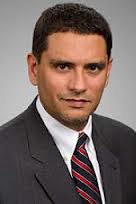 Dr. Jose Cruz says we need “bold reformers and disruptive innovators” to overcome obstacles to educational attainment.
Dr. Jose Cruz says we need “bold reformers and disruptive innovators” to overcome obstacles to educational attainment.TAMPA — As he looked around the ballroom at the participants in the Black, Brown & College Bound conference, Dr. Jose L. Cruz struck an almost somber tone to start his remarks.
He spoke of 16.4 million children in the USA living in poverty and how the wealthiest 20 percent of Americans take home half of all income while the poorest 20 percent earn almost none. He noted that the nation’s income disparity is at an all-time high, rivaling that of countries such as Tunisia, Sri Lanka and Morocco.
“This is a land of opportunity,” said Cruz, the Provost and Vice President for Academic Affairs at Cal State Fullerton. “We say to ourselves and to the rest the world that regardless of your socio-economic background, ethnicity and your race, if you work hard and you play by the rules, you will make it. It’s also part of our national narrative that if parents work hard, and they save, and they instill the right values in their children, this will ensure that their children are better off than they were.
“These are two important narratives that define us as a country, but when you look at the data and the current state of affairs in this country, you quickly come to realize that these two powerful narratives are no longer true and we need to turn that around.”
The theme of the four-day conference is “Rebuilding the ‘Village’ for African-American and Latino Males in Higher Education,” an approach presented as vital to preserving the nation’s status in the world in terms of a society and a work force. Among other notable speakers are Dr. Michael Eric Dyson, professor of sociology at Georgetown University; Dr. Khalil Gibran Muhammad, director of the Schomburg Center for Research in Black Culture; and Dr. Samuel Betances, professor emeritus of Harvard University.
The conference, presented by Hillsborough Community College, hones in on identity, cultural heritage, community involvement and educational attainment as areas of focus in helping Black and Latino males close the achievement gap.
Cruz offered five strategies to combat the widening achievement gap: level the playing field by ending the clustering of low-income students and students of color in schools where we expect less; rethink misguided financial aid policies; validate and replicate successful schools; validate and replicate successful school districts; and validate and replicate successful postsecondary institutions.
The latest available data shows that the lowest income students who go to college pay 72 percent of their annual household income to pay for college costs, compared to 24 percent for middle-income families. High-income families paid 13 percent of their household income.
Cruz said public institutions are biased toward providing financial aid to those who need less, federal programs are being attacked as being unsustainable and “more and more of the sparse financial aid dollars available at the state level are flowing from need-based programs to so-called merit programs.”
The actions, he suggests, fly in the face of reality.
“Twenty million of the 49 million students who are currently in our [Kindergarten] through 12th schools are students of color,” said Cruz, who noted that 16 percent of Latino and 28 percent of African-American men between the ages of 25 and 34 had obtained an associate degree or higher, while the comparable figure for White men was 44 percent and for Asian men, 70 percent. “Twenty-two million of the 49 million in school today are from low-income families. So we’re seeing that the demographics are changing in a way that will make the future of this country even more dependent on our ability to educate those students that we have traditionally been least able to educate.”
Still, Cruz said there are positive signs, such as the number of students entering college is increasing for all races and ethnic groups, and there are plenty of success stories in closing achievement gaps when the resources and commitment aren’t an issue.
To meet the challenge to the scale that’s needed, though, will take “bold reformers and disruptive innovators,” Cruz said, adding that there’s no time for inaction.
“Stakes are extremely high and there is just no other option,” said Cruz. “Hopefully, as Congress and state legislators around the country are talking about budget deficits, they will consider the opportunity deficits that our country is facing.”





















